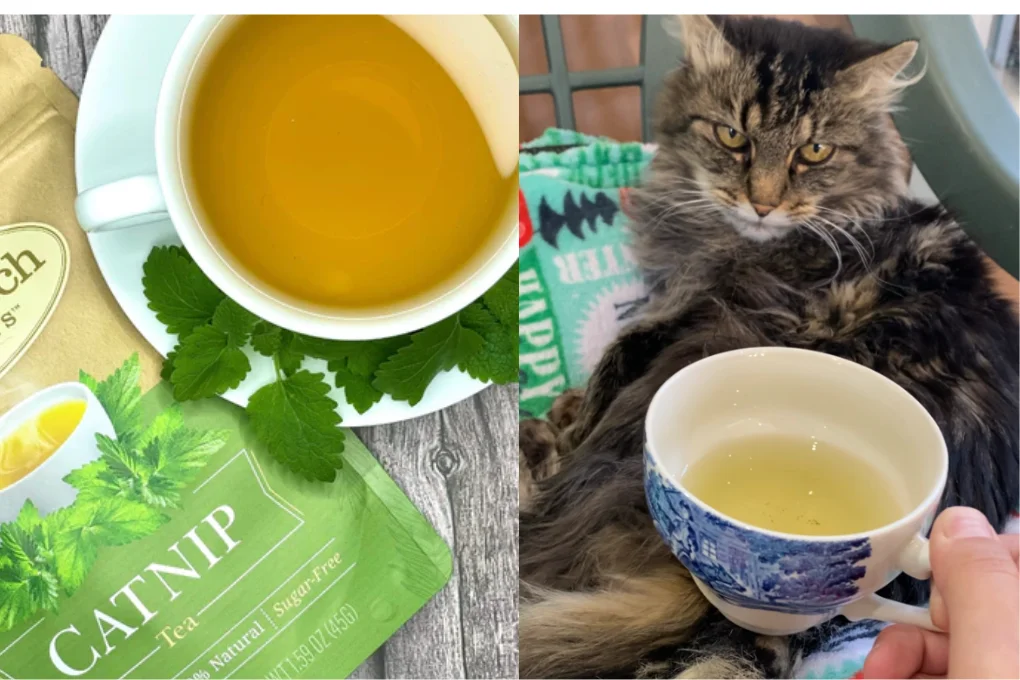How To Make Catnip Tea For Your Cat? In today’s pet-loving world, we often seek ways to pamper our furry companions. One such delight for cats is catnip tea.
It’s not only enjoyable for your feline friend but also has some potential benefits.
I’m going to share my tried-and-true method for making catnip tea for your cat. As a devoted cat owner and avid tea lover, I’ve discovered that brewing this herbal concoction can be a delightful way to provide relaxation and enjoyment for your furry friend.
Catnip, scientifically known as Nepeta cataria, is a herb that cats adore, thanks to its natural compounds that induce euphoria in our beloved pets.
In this step-by-step guide, I’ll walk you through the process of creating a soothing cup of catnip tea that’s safe and enjoyable for your cat.
Whether you’re looking to calm a restless kitty or simply want to treat them to a special treat, making catnip tea at home is a simple and cost-effective solution. So, let’s get started on this perfect journey to pampering your precious feline companion!
Table of Contents
What is Catnip Tea?
Catnip tea is a soothing herbal infusion made from the dried leaves and flowers of the catnip plant (Nepeta cataria).

Catnip, also known as catmint, is a member of the mint family and is famous for its euphoric effects on cats. When brewed as a tea, it can be a delightful treat for your feline companion.
Why Give Catnip Tea to Your Cat?
Giving Catnip Tea to your cat can have several benefits:
1. Stress Relief: Catnip tea can help alleviate stress and anxiety in cats, making it especially useful for those who are easily agitated.
2. Relaxation: Catnip tea induces a sense of calm and relaxation in cats.
3. Stress Reduction: It’s great for anxious cats, helping to reduce stress.
4. Mental Stimulation: Catnip stimulates your cat’s mind, making playtime more enjoyable.
5. Improved Digestion: Some cats may benefit from catnip tea’s digestive properties, which can ease minor tummy discomfort.
6. Bonding Time: Sharing catnip tea can strengthen the bond between you and your feline friend.
7. Natural Herb: Catnip is safe and natural, without harmful additives.
8. Occasional Treat: It’s a fun and occasional treat for your cat’s enjoyment.
How To Make Catnip Tea For Your Cat?
Gathering the Essentials
Before you embark on making catnip tea for your cat, ensure you have the following essentials ready:
• Dried Catnip Leaves and Flowers: You can either buy them from a pet store or grow catnip at home.
• A Teapot or Infuser: To brew the tea effectively.
• Fresh Water: Always use fresh, clean water for brewing.
• A Cat-Safe Cup or Dish: To serve the tea to your cat.
Catnip Tea – Pure Herbal Tea

Steps to Brew Catnip Tea
1. Choosing the Right Catnip
Start by selecting high-quality dried catnip leaves and flowers. If you’re growing your catnip, ensure it’s free from pesticides and chemicals. Organic catnip is the best choice.
2. Preparing the Tea
- Boil water and let it cool slightly. You don’t want it to be scalding hot.
- Place the dried catnip leaves and flowers in a teapot or infuser. Use approximately 1-2 teaspoons per cup of water.
- Pour the hot water over the catnip and let it steep for about 5-10 minutes. This allows the flavors and beneficial compounds to infuse into the water.
3. Serving the Tea to Your Cat
- Once the catnip tea has cooled to room temperature, strain it into a cat-safe cup or dish.
- Present it to your cat in a calm and quiet environment.
- Observe your cat’s reaction and let them enjoy the tea at their own pace.
Catnip Tea Dos and Don’ts
Dos
• Do offer catnip tea in moderation. A few sips are sufficient.
• Do ensure the tea is at room temperature before serving.
• Do supervise your cat while they enjoy their tea.
Don’ts
• Don’t force your cat to drink catnip tea if they show no interest.
• Don’t make catnip tea a daily routine; it’s best as an occasional treat.
• Don’t use excessive amounts of catnip in the tea.
Frontier Co-op Organic Catnip, 1-Pound Bulk

Observing Your Cat’s Reaction
Every cat reacts differently to catnip tea. Some may become playful, while others might become relaxed or even a bit silly.
Pay attention to your cat’s response, and adjust the frequency of offering catnip tea accordingly.
How Often Can You Offer Catnip Tea?
It’s best to offer catnip tea as an occasional treat, perhaps once a week or on special occasions. Overindulgence can reduce its effectiveness, so moderation is key.
Is Catnip Tea Safe for Kittens?
Catnip tea is generally safe for adult cats. However, it’s not recommended for kittens under six months old, as their bodies are still developing, and the effects of catnip can be unpredictable.
How much catnip tea do I give my cat?
When it comes to serving catnip tea to your cat, it’s essential to exercise caution and moderation. Remember, every cat is unique, and their reactions to catnip can vary.
Start with a small amount
Begin by offering just a teaspoon or less of catnip tea to your cat. This allows you to gauge their response without overwhelming them.
Observe your cat
Pay close attention to your cat’s behavior after consuming the tea. Look for signs of excitement, playfulness, or relaxation. Some cats may become more active, while others might become mellow.
Limit frequency
Avoid giving catnip tea daily. Reserve it for occasional treats or when you want to provide some extra enrichment for your cat.
Adjust as needed
Based on your cat’s reaction, you can adjust the amount and frequency. Some cats may enjoy catnip tea more than others.
Consult your vet
If you have any concerns or questions about giving catnip tea to your cat, it’s always a good idea to consult your veterinarian for personalized advice.
Is catnip tea safe for your cat?
Catnip tea is safe for your cat in moderation.
Catnip (Nepeta cataria) is an herb that many cats enjoy. It can stimulate their senses and make them playful.
However, excessive consumption might lead to digestive issues. Offer it occasionally and observe your cat’s reaction. Always consult with your veterinarian if you’re unsure.
How Often Can You Offer Catnip Tea?
It’s best to offer catnip tea as an occasional treat, perhaps once a week or on special occasions. Overindulgence can reduce its effectiveness, so moderation is key.
Is Catnip Tea Safe for Kittens?
Catnip tea is generally safe for adult cats. However, it’s not recommended for kittens under six months old, as their bodies are still developing, and the effects of catnip can be unpredictable.
Storing Catnip Tea
You can store leftover catnip tea in the refrigerator for up to three days. Beyond that, it may lose its potency.
Alternatives to Catnip Tea
If your cat doesn’t respond well to catnip tea or you’re looking for alternatives, consider toys or treats infused with catnip, which can also provide enjoyment and stimulation for your pet.
Can Humans Drink Catnip Tea?
Yes, catnip tea is safe for humans to drink. In fact, catnip has been used in traditional herbal medicine for its mild calming properties. It can help with relaxation and even aid in relieving certain digestive discomforts.
Consuming small amounts of catnip tea poses no harm to adults, but excessive intake may result in unpleasant side effects such as headaches, vomiting, and digestive discomfort.
Catnip is known to have diuretic properties, leading to increased urination, which, if taken in excess, can potentially lead to dehydration.
To make catnip tea for yourself, steep 1-2 teaspoons of dried catnip leaves in hot water for about 5-10 minutes. You can add honey or lemon for flavor.
However, keep in mind that the effects of catnip on humans are far milder than what cats experience.
It won’t make you roll around or chase imaginary mice! So, feel free to enjoy a cup of catnip tea for its soothing qualities.
FAQs
Can I use fresh catnip instead of dried for making tea?
Yes, you can use fresh catnip, but make sure it’s pesticide-free and safe for consumption.
My cat didn’t react to catnip tea. Is that normal?
Yes, not all cats are affected by catnip. It’s entirely normal if your cat doesn’t show much interest.
Can I add other herbs to the catnip tea for added flavor?
You can experiment with cat-safe herbs like chamomile or valerian, but do so in moderation and monitor your cat’s reaction.
Where can I find organic catnip for brewing tea?
You can often find organic catnip at pet supply stores, and health food stores, or even grow it in your own garden.
Conclusion
In wrapping up our journey on how to make catnip tea for your cat, I hope you’ve found this guide both informative and enjoyable.
As a devoted cat owner, I understand the joy of pampering our feline companions with a little something special now and then.
Creating this herbal concoction can be a delightful way to bond with your cat, providing them with a bit of relaxation and amusement.
Just remember to start with small servings, observe their reactions, and adjust accordingly. Your cat’s safety and happiness should always be the top priority.
Catnip tea can be a delightful and enriching treat for your cat when offered in moderation. It not only provides enjoyment but can also help relieve stress and improve digestion.
Remember to observe your cat’s reaction and always prioritize their safety and well-being.

Hi there! My name is Koushik; I am a cat lover. I specialize in writing about pet care & food. I have a wealth of knowledge on cat food niches and related subjects. I have worked in the pet industry for over 5 years and am passionate about helping cat owners provide the best care for their furry friends. With knowledge of cat food and nutrition, I aim to share their insights and help cat owners navigate the world of cat food niches. I enjoy playing with my two cats, reading, and exploring new cat food brands in my free time.
